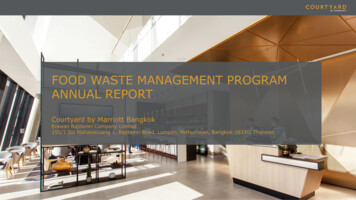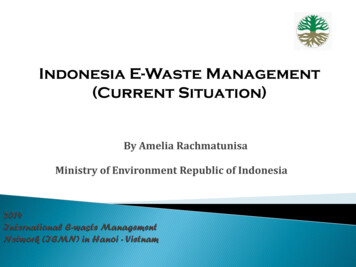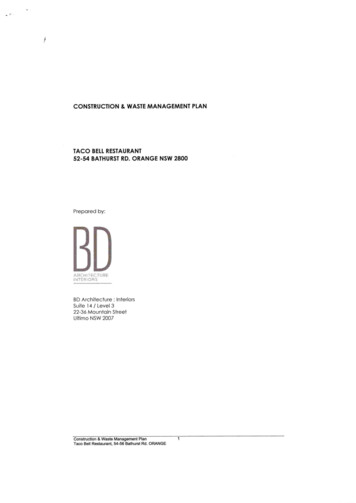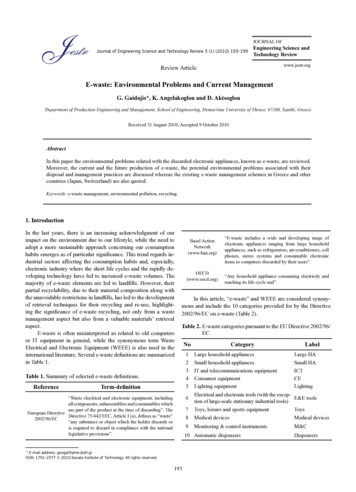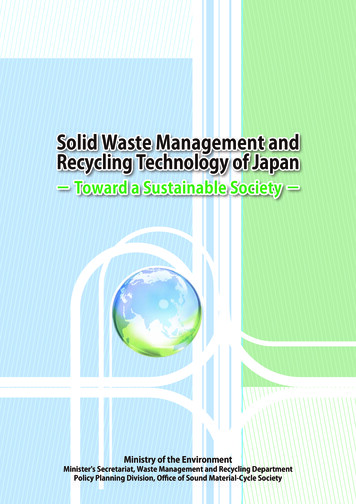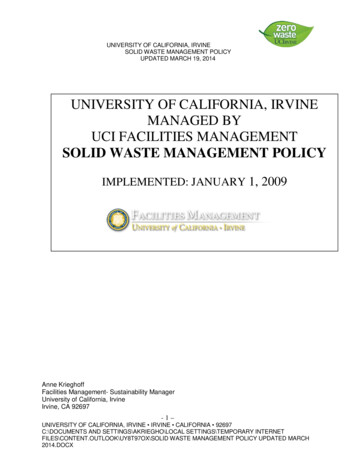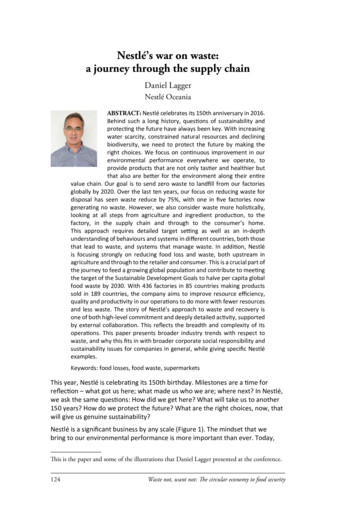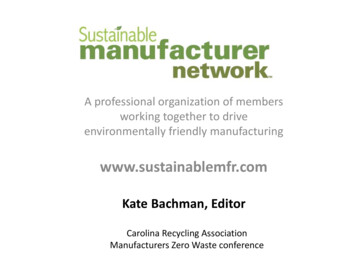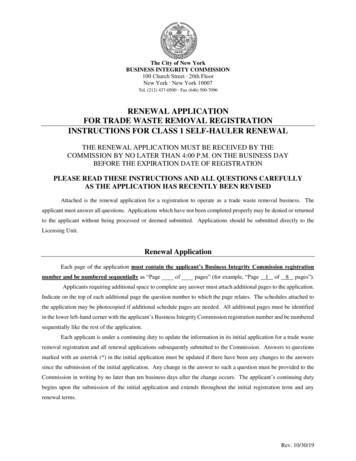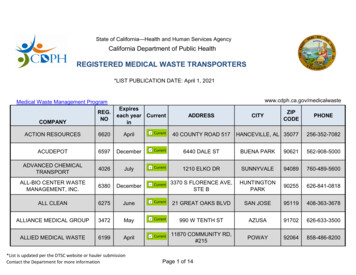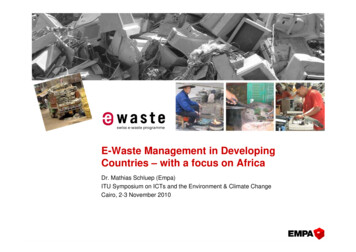
Transcription
E-Waste Management in DevelopingCountries – with a focus on AfricaDr. Mathias Schluep (Empa)ITU Symposium on ICTs and the Environment & Climate ChangeCairo, 2-3 November 2010
e-Waste as an issue in developing countriesFast growing consumption of e-products ( 1billion mobilephones, 1/4billion note books 2008)Fastest growing household waste in EU e-wasteImportant % of scarce metals ends in e-wasteDeveloping and emerging countries are seriously affectedsince they produce a growing amount of e-waste by themselves some of them receive e-waste from industrialised countries they have many cheap and unskilled workers they face a lack in suitable laws and their enforcement2 Empa/Switzerland, 3 November 2010
EmpaSince 20 years Empa assists e-waste management systemsin Switzerland and abroad (e-Waste Team 8 / 800): Audits and R&D for Swiss system operators SENS, SWICO,(SLRS & INOBAT) represents Switzerland in the European WEEE Forum founding member StEP-Initiative Managing e-waste projects in e.g. China, India, South Africa,Peru, Colombia, Morocco, West- East Africa etc. Current e-waste research topics flame retardants in plasticsno-emission recycling for LCD-displaysmodelling of long term stocks and flows (crt-glass etc.)recycling business models for informal sectorcompare eco efficiency in recycling strategies. Empa/Switzerland, 3 November 20103
Swiss Knowledge Partnerships in e-Waste RecyclingA global programme resting on 2 pillarsCapacity Building:cooperate with five countries: China, India, South Africa, Colombia and Peruto facilitate the development of sustainable e-waste management systemsKnowledge Management:connect national stakeholders internationally to stimulate knowledge andknowhow exchange on e-waste management (e.g. StEP Initiative) Empa/Switzerland, 3 November 20104
Empa’s recent and current activities in AfricaMoroccoUganda & Tanzania:e-Waste Management in AfricaAssessment StudyFeasibility StudyRefurbishment Centre InitiativeAssessment StudyFunding Agency: HP, GTZProject Partner: DSF, CMPPTime Frame: 2007 - ?Funding Agency: Unido, MicrosoftProject Partner: UCPC, CPCTTime Frame: 2007 - 2010Kenya:e-Waste Management in AfricaAssessment StudyFunding Agency: HPProject Partner: DSF, KICTANeTTime Frame: 2007 - 2008Senegale-Waste Management in AfricaAssessment StudyFunding Agency: DSFProject Partner: SENECLICTime Frame: 2007 - 2008South Africa:SECOSwiss e-Waste ProgrammeFacilitating the development of a nationale-waste management strategyBenin, Côte d’Ivoire,Ghana, Liberia, Nigeria:Funding Agency: SECOProject Partner: ITA, EWASATime Frame: 2003 – 2009The Basel Convention e-Waste Africa ProjectAssessment StudyTraining Pilote-Waste Management in AfricaLaunching an e-waste recycling unit in Cape TownFunding Agency: SBC, EUProject Partner: African BCRCs,IMPEL, Öko-InstitutTime Frame: 2009-2011 Empa/Switzerland, 3 November 2010Funding Agency: HPProject Partner: DSF, Recover-e-Alliance, EnvirosenseTime Frame: 2007 - 20085
Personal Computer penetration in AfricaEstimated based onITU data and GDP/PPP correlations Empa/Switzerland, 3 November 20106
PC penetration in Africa compared to the worldIn 2005 Africa generated approx. 2% of the worlds PC wasteRegionMio PieceskTonnes36,78075,913724,8549Middle East2,045Africa1,639Central Asia0,922East Asia25,7595Total97,72194North AmericaLatin America & CaribbeanEuropePresented at R’09: Mueller E., Schluep M. et al.(2009). Assessment of e-waste flows: a probabilistic approach to quantify e-waste based on world ICT anddevelopment indicators. R’09 Twin World Congress, Davos/ Switzerland and Nagoya/ Japan, 14-16 September . Empa/Switzerland, 3 November 20107
Correlation GDP / PPP with e-waste generation40000SwitzerlandGDP per capita, PPP(current international )350003000025000200001500010000South Africa5000MoroccoUgandaGhana0 Kenya0510e-Waste generation per capita (in kg)(data based on country assessments) Empa/Switzerland, 3 November 2010815
Ghana: Imports of W(EEE)New imports (64'000 tons)Second hand imports (149'000 tons) Formal business importers Small scale / informal importers (e.g. by family members/relativesabroad) Imports of untested EEE (Grade D) It is estimated that around 30% already arrives as unsellabledevices / e-waste (44'000 tons)Private imports of new/second hand EEE (1'300 tons) Laptops, Cameras, DVD Players, Game Consoles, MobilePhones and MP3 Players are privately imported (past customs)by people arriving at the airport Empa/Switzerland, 20 July 20099
Ghana: Imports of W(EEE)comtrade.un.org Empa/Switzerland, 20 July 200910
Simplified massbalance Ghana all of (W)EEE (cat. 1-4)RecyclingBurning Empa/Switzerland, 3 November 201011
Estimation of dioxin emissions from cable burning in thegreater Accra region 1000 tonnes / year burnt cables in Greater Accra Region Thereof is 38% plastic 400 tonnes / year Thereof is 62% copper 600 tonnes / yearPreliminary estimation of total dioxin (PCDD/F) emissions to airfrom open cable burning in the Greater Accra Region: Source Strength 5 g / yearCompared with the European dioxin air emission inventory for2005 (EU15 Norway Switzerland, Quass et al. 2004) this equals to: 0.25 – 0.5 % of total dioxin emissions 2.5 – 5 % of dioxin emissions from municipal waste incineration 15 – 25 % of dioxin emissions from industrial waste incinerationRef: Quass et al. 2004: The European dioxin air emission inventory project – final results. Chemosphere 54, 1319–1327. Empa/Switzerland, 20 July 200912
e-Waste recycling technologies for developing countries Analysis of the market potential ofinnovative technologies for the ewaste recycling sector in selecteddeveloping countries. Classification of countries accordingto their current market situations andframework conditions. Application of the UNEP FrameworkTechnology Transfer Activities inSupport of Global Climate ChangeObjectives Identification of innovation hubs Empa/Switzerland, 26 August 2009Schluep M. et al.(2009). Recycling - from e-waste to resources, Sustainableinnovation and technology transfer industrial sector studies. United NationsEnvironment Programme, Paris, France.http://www.ewasteguide.info/UNEP 2009 eW2R13
Classification of countries by ‘informality’Without proper measures in African countries it is likely thatinformal activities will increaseinformal sectoris decreasingsmall scale(individualinformalcollectors anddismantlers)To be avoidedUgandaTanzaniaKenyaSenegalLiberia BeninCColombiaPeruASouth AfricaMoroccoCôte d’Ivoireestablished(organizedinformal sectordoing collection,pre-processingand refining)Ghana(Mexico) (Brazil)NigeriaDBsmall scale(a few individuals or smallcompanies doing mainlymanual dismantling) Empa/Switzerland, 3 November 201014India Chinaestablished(collection partly organized,operations of at least a fewspecialized SMEs doingalso mechanical preprocessing)formal sectoris increasing
Appropriate knowledge and technology transferGroup A (e.g. Benin, Kenya, Liberia, Senegal; Tanzania ,Uganda) - mainly “small” African country classified as promising for the introduction of pre-processingtechnologies with a strong support in capacity building.Group B (India, China) - no African country classified as having a significant potential for the introduction ofpre- and end-processing technologies with a strong support incapacity building in the informal sector Empa/Switzerland, 3 November 201015
Appropriate knowledge and technology transferGroup C (e.g. South Africa, Morocco) - mainly Africancountry with “stronger” economies classified as having a significant potential to adapt pre- and tosome extent end-processing technologies to their own needs,following a technology and knowledge exchange.Group D (e.g. Côte d’Ivoire, Ghana, Nigeria) - mainly largercountries in West Africa classified as promising for the introduction of pre-processingtechnologies with a strong support in capacity building in theinformal sector, following a technology and knowledge exchange. Empa/Switzerland, 3 November 201016
Tentative classification of countries – the way forwardInformal collection and manual dismantling activities can beincluded in a formalized e-waste management framework Formalizing informal sectors is often not realistic, but connectingit to a formal system can be the first step The informal collection system is efficient in countries like Indiaand China Deep-level manual dismantling in formal or informalenvironments is preferred over semi-automatic processes due tothe abundant workforce and low labour costs All other informal activities such as wet-chemical leaching beargreat adverse environmental and social impacts and are alsooften less attractive from an economical point of view thaninnovative technologies as identified above.See also:Rochat D., Rodrigues W., et al. (2008) India: Including the Existing Informal Sector in a Clean e-Waste Channel. In: Proceedings of the WasteManagement Conference (WasteCon2008), Durban, South Africa.Sepúlveda, A., M. Schluep, et al. (2010) A review of environmental fate and effects of hazardous substances released from electrical andelectronic equipments during recycling: examples from China and India. Environmental Impact Assessment Review, 30, 28–41.Wang, F. (2008). Economic conditions for developing large scale WEEE recycling infrastructure based on manual dismantling in China - thelearning experience from the setup of a pilot plant. Master Thesis, Universiteit Leiden, Delft University of Technology, The Netherlands. Empa/Switzerland, 3 November 201017
India: Efficiency and sustainability of gold recoveryInformal sector BangaloreState of the art smelter only 20% gets recovered 60% loss due to the manualdismantling process 50 % loss due to the wet-chemicalleaching process Emissions are dramatic: up to 400xEuropean thresholds Recovery rate of up to 95% Plus other metal, e.g. palladium,silver, copper etc, Empa/Switzerland, 3 November 2010 High – tech off-gas control andtreatment system18
More than technology is needed Having a market potential for e-waste recyclingtechnologies doesn’t necessarily mean that anoperation can be run in a self-sufficient way (paid bythe sales of recycling output fractions or materials). Sustainable recycling of e-waste will always demandfor a proper managed framework and a financingscheme. Support in e-waste management in Africa has to followa holistic approach (e.g. Durban Declaration) Empa/Switzerland, 3 November 201019
Durban DeclarationThe Durban Declaration on e-Waste Management in AfricaThe main issues related to an improvement of the current e-wastemanagement practices encountered on the African continent andelsewhere were synthesized in the "Durban Declaration on e-WasteManagement in Africa" during the WasteCon2008 in Durban, SouthAfrica. It was agreed that every country requires its own process to defineits specific roadmap, however, general recommendations were suggested:1.improve cooperation among stakeholders (3 recom.)2.establish an institutional framework (2 recom.)3.create awareness at all levels of governance & the general public (2recom.)4.support markets (3 recom.)5.collect and manage data (3 recom.)6.develop a legal framework (5 recom.)7.develop a qualified and efficient e-waste recycling sector (5 recom.) Empa/Switzerland, 3 November 201020
How to implement a holistic rsRepair rgeRecyclersSmallrecyclersInformalDumping &BurningImports(Donations)System BoundaryInterventionMechanisms:Policy & Legislation Licensing Legislation Empa/Switzerland, 3 November 2010Business & FinanceTechnology & Skills Take back scheme Technical control andfixed contracts New business models Knowledge andtechnology transfer Formalizing theinformal sector Trainings21Monitoring and Control Standards Audits Monitoring MassflowsMarketing & Awareness Information Campaignson all levels
Current progresses in AfricaBusiness & FinancePolicy & LegislationCountry AssessmentNational StrategyTechnology & SkillsSouth Africa, Kenya, Uganda, Tanzania, Nigeria, Benin, Ghana, Côte d‘Ivoire,(Liberia), Senegal, Morocco, (Tunisia, Egypt)South Africa, Kenya, Uganda, Nigeria, Benin, Ghana 233545221382ImplementationPilotSolutions shapingSouth Africa,Uganda, Kenya,Nigeria, Ghana,(Tunisia)South AfricaSouth Africa,Kenya,Morocco,Senegal,(Tunisia)South Africa(certain)Solutions established Empa/Switzerland, 3 November 2010Marketing & AwarenessMonitoring & Control22South AfricaSouth Africa,Uganda,Kenya, Nigeria,Ghana;Morocco,(Tunisia, Egypt)
Thank youDr. Mathias SchluepEmpaLerchenfeldstrasse 59014 ogy & Society Lab:www.empa.ch/tslSwiss e-Wast Programme:www.ewasteguide.infoSwiss e-Waste Competencewww.e-waste.ch Empa/Switzerland, 3 November 201023
Tentative classification of countriesNormally, a sustainable recycling system should growtowards the upper right corner of the graphinformal sectoris decreasingsmall scale(individualinformalcollectors anddismantlers)UgandaTanzaniaKenyaSenegalLiberia BeninCColombiaPeruASouth AfricaMoroccoCôte d’Ivoireestablished(organizedinformal sectordoing collection,pre-processingand refining)Ghana(Mexico) (Brazil)NigeriaDBsmall scale(a few individuals or smallcompanies doing mainlymanual dismantling) Empa/Switzerland, 3 November 201024India Chinaestablished(collection partly organized,operations of at least a fewspecialized SMEs doingalso mechanical preprocessing)formal sectoris increasing
Tentative classification of countries – the way forwardGroup A (e.g. Benin, Kenya, Liberia, Senegal; Tanzania ,Uganda) - mainly “small” African country includes countries featuring the formal and informal sector on asmall scale, if existent at all e-waste volumes were too small for the formation of informal orformal recycling activities as e-waste volumes also increase over time, those countriestypically could move towards more informal activities ifappropriate measures are not taken classified as promising for the introduction of pre-processingtechnologies with a strong support in capacity building. Pre-processing technologies include: Manual dismantling/ sorting of fractionsDe-gassing CFC, HCFCSemi-automatic CRT cut and cleaning Empa/Switzerland, 3 November 201025
Tentative classification of countries – the way forwardGroup B (India, China) - no African country includes countries featuring an established informal and formalsector. e-waste volumes are large and in turn a well-organized informalsector was formed. The formal sector operates as a downstreampartner and was not able to establish itself as a competitor foractivities typically performed by the informal sector provided a better control of the informal sector, these countrieswould have the technological and economical capacity to adaptsustainable recycling technologies. classified as having a significant potential for the introduction ofpre- and end-processing technologies with a strong support incapacity building in the informal sector Empa/Switzerland, 3 November 201026
Tentative classification of countries – the way forwardGroup C (e.g. South Africa, Morocco) - mainly Africancountry with “stronger” economies includes countries featuring a currently developing or alreadyestablished formal recycling sector, while informal activitiesremain on a small or medium scale Typically include politically “stable” emerging economies (Domestic) e-waste volumes were large enough to supportpioneering entrepreneurs Group C is classified as having a significant potential to adaptpre- and to some extent end-processing technologies to theirown needs, following a technology and knowledge exchange. Pre-processing technologies include: Manual dismantling/ sorting of fractionsDe-gassing CFC, HCFCSemi-automatic CRT cut and cleaningAt a limited scale full-automated technologies (mid to long term) Empa/Switzerland, 3 November 201027
Tentative classification of countries – the way forwardGroup D (e.g. Côte d’Ivoire, Ghana, Nigeria) - mainly largercountries in West Africa includes countries featuring a currently established informalrecycling sector, while formal activities remain on a small scale Informal activities seem to be triggered by waste and secondhand imports, while domestic e-waste volumes play increasinglyan important role Group D is classified as promising for the introduction of preprocessing technologies with a strong support in capacitybuilding in the informal sector, following a technology andknowledge exchange. Pre-processing technologies include: Manual dismantling/ sorting of fractionsDe-gassing CFC, HCFCSemi-automatic CRT cut and cleaningAt a limited scale full-automated technologies (mid to long term) Empa/Switzerland, 3 November 201028
Funding Agency: HP Project Partner: DSF, KICTANeT Time Frame: 2007 - 2008 South Africa: Swiss e-Waste Programme Facilitating the development of a national e-waste management strategy Funding Agency: SECO Project Partner: ITA, EWASA Time Frame: 2003 – 2009 e-Waste Management in Africa Lau
